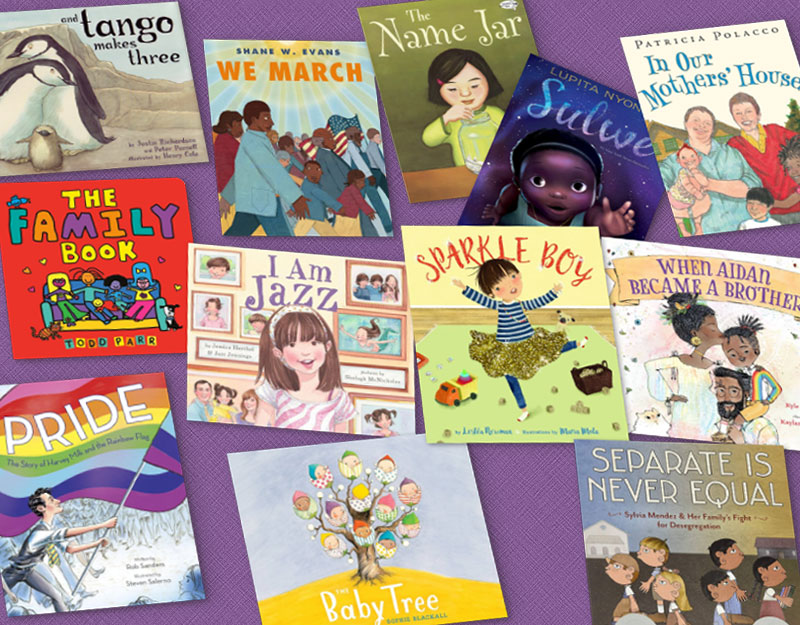Banned Books for Storytime | First Steps
Extending Brooklyn Public Library’s Books Unbanned initiative to young kids and parents.

With book bans on the rise, including many picture books, we have begun offering Books Unbanned Storytime at Brooklyn (NY) Public Library (BPL) as a special event year-round, for children ages three and up. Our goal was to extend BPL’s Books Unbanned initiative to a wider age range.
As Jessica Ralli, BPL coordinator of early literacy programs and a coauthor of children’s books that have been banned, says: “We need banned books, especially in story time, so that children and families who need them will find them.”
 At our programs, we read two to three banned books, display banned or challenged titles, provide talking points for grown-ups on sharing them with kids, discuss book bans in kid-friendly ways, and distribute banned books to families to take home.
At our programs, we read two to three banned books, display banned or challenged titles, provide talking points for grown-ups on sharing them with kids, discuss book bans in kid-friendly ways, and distribute banned books to families to take home.
Before reading a book, and to prime the discussion, we say: “Remember, a book ban or challenge is when somebody says they don’t like a book so it should be taken out of the library. While I am reading, see if you can guess the reasons why somebody wanted to ban or challenge it.” According to Ralli, one seven-year-old shared the following response: “Because people are afraid of things that they don’t know much about.”
As well as reading banned books, we sing and chant about the freedom to read. You can sing the “Banned Book Song for Young Readers” by YouTube’s “Pancake Librarian” or have kids join in on former American Library Association’s president Tracie D. Hall’s chant: “Free people read freely!”
While this program may not be supported in every community, Dickinson says, “I’ve never had an angry parent confront me about me reading banned books at story time. The parents are always shocked, dismayed, and supportive.”
At BPL, the response to our Books Unbanned Storytimes has been overwhelmingly positive. Maria McGrath, children’s librarian at BPL’s Macon Library, reports that caregivers were delighted they got to choose a book to take home and disappointed that such great books are banned. “I said we should look at the bright side that we have an opportunity to share these books,” says McGrath.
We have also found that these programs are an opportunity to model reading and discuss books on challenging topics, like race, gender, and LGBTQIA+ identity. Before or after reading a book, you could say, “Don’t be afraid to share an age-appropriate book about big topics, like race or gender, with your children. Ask open-ended questions as you read to find out what they are thinking and use it as time to clear up any misconceptions. You can also use it as time to reaffirm your family’s values.”
If your story time audience is too young to have a discussion on the topic, set up a display with banned picture books with resources for parents. Ami Jones, youth services librarian at Alamogordo (NM) Public Library, says, “I include [banned books] often, and during craft time I will casually ask the parents if they can figure out which book was removed from a school or library, and why. This helps keep the topic—and the ludicrousness of it—in parents’ minds, without being pedantic.”
Anne Wilmoth, librarian at the Iowa City (IA) Public Library, creates Canva slides for her programs, and during Banned Books Week, adds the reasons the titles she shares are banned.
At their very first Books Unbanned Storytime at BPL’s New Utrecht Library, assistant branch manager Diane Chiofolo asked the children why they might read banned or challenged picture books. The response? “Because it’s fun.” And, “Because you might learn something new.” Those are responses we want for any story time!
Rachel G. Payne is coordinator of early childhood services at Brooklyn Public Library.
RELATED
The job outlook in 2030: Librarians will be in demand
The job outlook in 2030: Librarians will be in demand
ALREADY A SUBSCRIBER? LOG IN
We are currently offering this content for free. Sign up now to activate your personal profile, where you can save articles for future viewing






Add Comment :-
Be the first reader to comment.
Comment Policy:
Comment should not be empty !!!